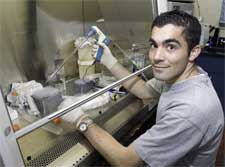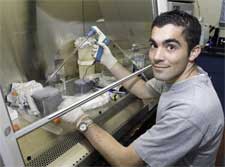 KINGSTON, R.I. – May 8, 2008 — When it was time for Edison, N.J. native Michael Segala to go away to college at the University of Rhode Island, his whole family went with him.
KINGSTON, R.I. – May 8, 2008 — When it was time for Edison, N.J. native Michael Segala to go away to college at the University of Rhode Island, his whole family went with him.
The Segala family left its long-time home in 2004 and moved to Richmond so Michael’s father, Jim, could enroll in a doctoral program at URI, and his older brother David transferred to URI from the University of New Haven and subsequently enrolled in a doctoral program as well.
With the University’s commencement ceremonies approaching on May 18, the youngest Segala will be in the spotlight. In addition to receiving bachelor’s degrees in physics and mathematics, Michael Segala will be honored with the President’s Award for Student Excellence as the top physics student on campus.
“I always liked math and science growing up, and I originally was a math major, but after taking a few physics courses I knew that was where my real interest lay,” he said. “I kept the math major because you need a very good mathematics background to pursue physics. You might say that math is the language of physics.”
Segala’s interest in physics grew quickly when he began working in a biophysics laboratory with URI Professor Yana Reshetnyak during his sophomore year.
“We work to deliver a peptide to cancer cells to kill the cancer,” said Segala. “The physical properties behind these systems — and applying them to real world issues — is what caught my attention and interest in physics.
“We have a peptide – a small segment of a protein – that is attracted to areas in the body that exhibit a low pH,” he explained. “The cellular environment around cancer cells has a low pH, so therefore we are able to target cancer cells and introduce a toxin into them, thereby rendering them dead while leaving healthy cells unaffected.”
Segala’s facility in the laboratory has led him to co-author eight articles and abstracts in scientific journals, including two in the prestigious Proceedings of the National Academies of Science, an accomplishment very few undergraduates can claim.
“I spent most of my undergraduate time in the lab, and that’s really what I’ve enjoyed the most,” he said. “It helped that my dad and brother had already told me about their research experiences, which gave me a sense of what to expect and how to approach it.”
Having his father studying and conducting research in the same URI department has been an unexpected plus. “It gives me a full-time tutor whenever I need one and has really motivated me to succeed. We even had two courses together, which turned out to be great!”
Following graduation, Segala will enroll in a doctoral program in physics at Brown University, with the goal of becoming a college professor and continuing to pursue research.
 “I think I’d like to eventually get into astrophysics,” he said. “I’ve always been intrigued with studying dark matter, black holes and the Big Bang.”
“I think I’d like to eventually get into astrophysics,” he said. “I’ve always been intrigued with studying dark matter, black holes and the Big Bang.”
Given his success to date, Segala should have no trouble shooting for the stars.

